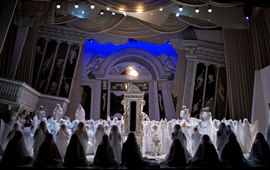> [Archived] Chronicles

'Mefistofele' Returns to Bucharest National Opera
The Mexican tenor proved to be an 'acquisition'
Besides bass Mihnea Lamatic, who also played the leading role at the first Bucharest representation and mezzo-soprano Sidonia Nica playing Marta/Pantalis, the rest of the cast is formed by beginners, the Mexican tenor José Manuel Chu proving to be an 'acquisition' for the opera house (his full, ample, well driven lyrical voice together with the warmth and luminosity demanded by the character of Faust, somehow compensates for his static and detached attitude concerning the multiple emotions experienced by the hero). Cluj born soprano, Edith Borsos, displayed, apart from her qualitative and generous voice, a manner of singing and a lack of contracting planes which denoted that the singer was concerned only with generating sounds (and not always the right way), and having nothing in common scenic-wise with Margherita, being closer to Elena. Tenor Liviu Indricau made his debut in the supporting role of Walter.
The children's choir - up to the challenge
The performance was conducted by Tiberiu Soare, who took over the demanding score and, who succeeded in delivering it with a steady hand, even trying a few delicate things which came out perfectly, a clear sign that the orchestra was more than capable once its members took an interest in the interpretation; surprisingly enough, the choir (choir-master: Stelian Olariu) experienced some serious troubles in act one, but afterwards recovered, and hoping that the angels'attitude and movement would become less... earthly and free, but the children's choir (children's choir master: Basil Corjos) was up to the challenge, and the ballet dancers were faithful in their interpretation of the choreography created by Razvan Mazilu, and that was the extent of it.
A word of appreciation is due for the machinists who, dressed up as monks, moved about the decors in extremely complicated transmissions, with an impeccable precision, everything being perfectly synchronized to the sound discourse. I did not understand why exactly the 'curtain' did not drop at the end of a scene, when the lights went out; the result was that the public could see the cast running backstage, the preparations for the next scene, which, obviously, forced the audience to brutally come back to reality, out of the atmosphere that was created up to that point.
Performers more or less suited for the main roles
As a whole, the performance was captivating as an image, it had beautiful musical moments, but somehow it seemed that the grandeur and the glamour of old had disappeared, and the cast has not yet found the right equilibrium. Unfortunately, with the exception on Hector Lopez, I believe that not even in the performances to come will the right performers be cast in the leading roles, perhaps based only on stage appearance … . And the audience will convince itself (either-or) during the next performances of this beautiful opera by Boito, whether I particularly liked it at the premiere (which made me to wholeheartedly recommend it for the 'Actualitatea Muzicala' Magazine Awardwhich it later won) and whether I might appreciate the future performances alike, which means that it has stood the test of time and it has earned the place of being permanently in BNO's repertoire. But I cannot help to remember that back then, soprano was the excellent Mioara Cortez, and in 2004, the roles of Margherita/Elena were performed flawlessly by Roxana Briban, who managed maybe her best performance to date... The new generation has not yet found the soloists to continue the accomplishment of those of yesterday, and not because they do not have the voice to do it, but because they do not know how or do not care enough to be interpreters, as well ...
Translated by Florina Sămulescu and Elena Daniela Radu
MTTLC, Bucharest University














